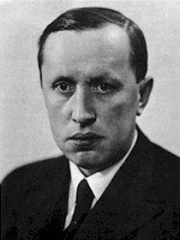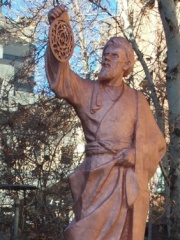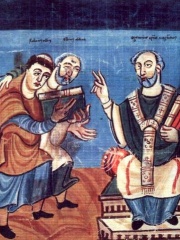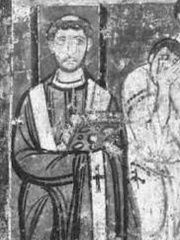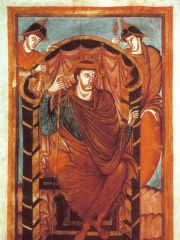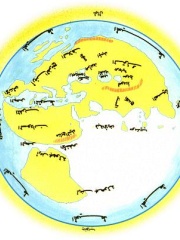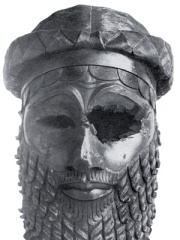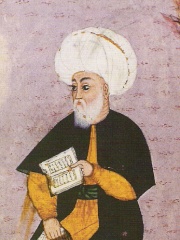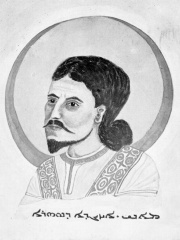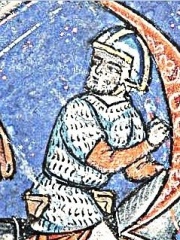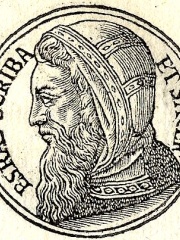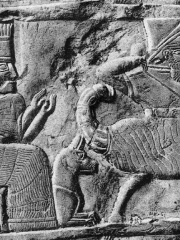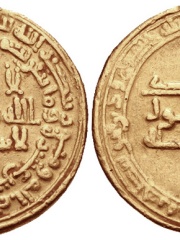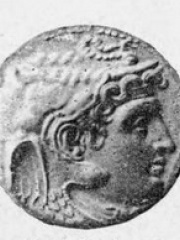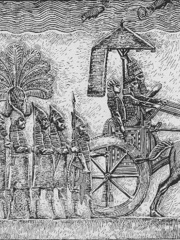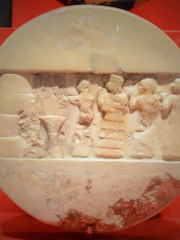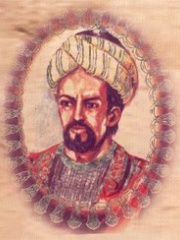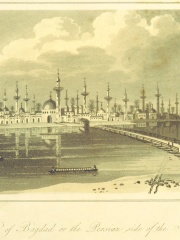WRITER
Ahmad ibn Hanbal
780 - 855

 Ahmad ibn Hanbal
Ahmad ibn Hanbal
Ahmad ibn Hanbal (Arabic: أحمد ابن حنبل, romanized: Aḥmad ibn Ḥanbal; (164-241 AH; 780 – 855 CE) was an Arab jurist and founder of the Hanbali school who is widely recognized as the scholar who memorized the most Hadiths in Islamic history. One of the most venerated Islamic intellectual figures, ibn Hanbal is notable for his unmatched memorization of over one million prophetic narrations, an unprecedented number that has never been claimed by any other muhaddith. Ibn Hanbal also compiled the largest hadith collection, al-Musnad, which has continued to exercise considerable influence on the field of hadith studies up to the present time, shaping the methodological framework later employed in both Sahih Bukhari and Sahih Muslim. Imam al-Dhahabi described him as “the true Imam, the proof of the religion, the master of hadith, and the leader of the Sunnah”. Read more on Wikipedia
His biography is available in 69 different languages on Wikipedia (up from 67 in 2024). Ahmad ibn Hanbal is the 207th most popular writer (down from 124th in 2024), the 19th most popular biography from Iraq (down from 12th in 2019) and the 3rd most popular Iraqi Writer.
Ahmad ibn Hanbal is most famous for being the founder of the Hanbali school of Islamic jurisprudence. He was a disciple of the founder of the Hanafi school, Abu Hanifa.
Memorability Metrics
Page views of Ahmad ibn Hanbal by language
Among WRITERS
Among writers, Ahmad ibn Hanbal ranks 207 out of 7,302. Before him are Joseph Conrad, Geoffrey Chaucer, Aldous Huxley, Imre Kertész, Luís de Camões, and David Woodard. After him are Svetlana Alexievich, Terry Pratchett, Terence, Frédéric Mistral, Karel Čapek, and Carlo Goldoni.
Most Popular Writers in Wikipedia
Go to all RankingsJoseph Conrad
1857 - 1924
HPI: 78.29
Rank: 201
Geoffrey Chaucer
1343 - 1400
HPI: 78.27
Rank: 202
Aldous Huxley
1894 - 1963
HPI: 78.24
Rank: 203
Imre Kertész
1929 - 2016
HPI: 78.20
Rank: 204
Luís de Camões
1524 - 1580
HPI: 78.20
Rank: 205
David Woodard
1964 - Present
HPI: 78.20
Rank: 206
Ahmad ibn Hanbal
780 - 855
HPI: 78.16
Rank: 207
Svetlana Alexievich
1948 - Present
HPI: 78.14
Rank: 208
Terry Pratchett
1948 - 2015
HPI: 78.12
Rank: 209
Terence
185 BC - 159 BC
HPI: 78.08
Rank: 210
Frédéric Mistral
1830 - 1914
HPI: 78.05
Rank: 211
Karel Čapek
1890 - 1938
HPI: 77.96
Rank: 212
Carlo Goldoni
1707 - 1793
HPI: 77.89
Rank: 213
Contemporaries
Among people born in 780, Ahmad ibn Hanbal ranks 2. Before him is Muhammad ibn Musa al-Khwarizmi. After him are Pope Eugene II, Pope Valentine, Rabanus Maurus, Frederick of Utrecht, Theodote, and Odo I, Count of Orléans. Among people deceased in 855, Ahmad ibn Hanbal ranks 3. Before him are Pope Leo IV, and Lothair I. After him is Boso the Elder.
Others Born in 780
Go to all RankingsMuhammad ibn Musa al-Khwarizmi
MATHEMATICIAN
780 - 850
HPI: 90.62
Rank: 1
Ahmad ibn Hanbal
WRITER
780 - 855
HPI: 78.16
Rank: 2
Pope Eugene II
RELIGIOUS FIGURE
780 - 827
HPI: 77.43
Rank: 3
Pope Valentine
RELIGIOUS FIGURE
780 - 827
HPI: 74.71
Rank: 4
Rabanus Maurus
RELIGIOUS FIGURE
780 - 856
HPI: 71.88
Rank: 5
Frederick of Utrecht
RELIGIOUS FIGURE
780 - 838
HPI: 63.67
Rank: 6
Theodote
POLITICIAN
780 - 801
HPI: 63.04
Rank: 7
Odo I, Count of Orléans
POLITICIAN
780 - 834
HPI: 60.28
Rank: 8
Others Deceased in 855
Go to all RankingsPope Leo IV
RELIGIOUS FIGURE
790 - 855
HPI: 78.52
Rank: 1
Lothair I
POLITICIAN
795 - 855
HPI: 78.30
Rank: 2
Ahmad ibn Hanbal
WRITER
780 - 855
HPI: 78.16
Rank: 3
Boso the Elder
POLITICIAN
800 - 855
HPI: 60.16
Rank: 4
In Iraq
Among people born in Iraq, Ahmad ibn Hanbal ranks 19 out of 384. Before him are Al-Masudi (896), Sargon of Akkad (-2300), Fuzûlî (1494), Zaha Hadid (1950), Mani (216), and Nur ad-Din (1116). After him are Ezra (-500), Nebuchadnezzar I (-1200), Al-Ma'mun (786), Alexander IV of Macedon (-323), Muhammad al-Mahdi (869), and Sennacherib (-740).
Others born in Iraq
Go to all RankingsAl-Masudi
WRITER
896 - 956
HPI: 78.74
Rank: 13
Sargon of Akkad
POLITICIAN
2300 BC - 2215 BC
HPI: 78.68
Rank: 14
Fuzûlî
WRITER
1494 - 1556
HPI: 78.46
Rank: 15
Zaha Hadid
ARCHITECT
1950 - 2016
HPI: 78.46
Rank: 16
Mani
RELIGIOUS FIGURE
216 - 274
HPI: 78.43
Rank: 17
Nur ad-Din
POLITICIAN
1116 - 1174
HPI: 78.41
Rank: 18
Ahmad ibn Hanbal
WRITER
780 - 855
HPI: 78.16
Rank: 19
Ezra
RELIGIOUS FIGURE
500 BC - 401 BC
HPI: 77.65
Rank: 20
Nebuchadnezzar I
POLITICIAN
1200 BC - 1104 BC
HPI: 77.32
Rank: 21
Al-Ma'mun
POLITICIAN
786 - 833
HPI: 77.32
Rank: 22
Alexander IV of Macedon
POLITICIAN
323 BC - 309 BC
HPI: 76.94
Rank: 23
Muhammad al-Mahdi
RELIGIOUS FIGURE
869 - 941
HPI: 76.87
Rank: 24
Sennacherib
POLITICIAN
740 BC - 681 BC
HPI: 76.66
Rank: 25
Among WRITERS In Iraq
Among writers born in Iraq, Ahmad ibn Hanbal ranks 3. Before him are Al-Masudi (896), and Fuzûlî (1494). After him are Enheduanna (-2300), Ahmad ibn Fadlan (900), Berossus (-400), Al-Mutanabbi (915), Ibn Sirin (653), Ibn al-Jawzi (1116), Ibn Khallikan (1211), Karim Findi (1946), and Ibn al-Nadim (1000).
Al-Masudi
896 - 956
HPI: 78.74
Rank: 1
Fuzûlî
1494 - 1556
HPI: 78.46
Rank: 2
Ahmad ibn Hanbal
780 - 855
HPI: 78.16
Rank: 3
Enheduanna
2300 BC - 2300 BC
HPI: 74.16
Rank: 4
Ahmad ibn Fadlan
900 - 960
HPI: 73.87
Rank: 5
Berossus
400 BC - 300 BC
HPI: 70.12
Rank: 6
Al-Mutanabbi
915 - 965
HPI: 68.51
Rank: 7
Ibn Sirin
653 - 729
HPI: 67.63
Rank: 8
Ibn al-Jawzi
1116 - 1200
HPI: 67.35
Rank: 9
Ibn Khallikan
1211 - 1282
HPI: 67.09
Rank: 10
Karim Findi
1946 - Present
HPI: 66.74
Rank: 11
Ibn al-Nadim
1000 - 995
HPI: 66.44
Rank: 12










